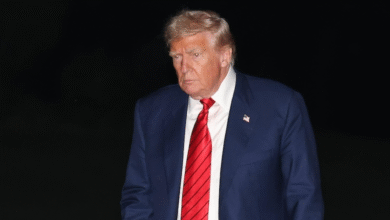Trump Constitution Due Process: Is He Upholding It?

The recent discourse surrounding Trump and the Constitution’s due process has sparked significant debate, especially in light of his bold promises regarding mass deportations. During a revealing NBC interview, Trump expressed uncertainty about whether he must fully uphold the Constitution, contrasting sharply with traditional interpretations of the Fifth Amendment. As he strives to fulfill his commitment to one of the largest deportation operations in U.S. history, the implications for immigration law have never been more pressing. Critics have pointed to Trump’s approach, advocating for swift removals without affording immigrants essential legal protections, despite Supreme Court rulings affirming due process rights. The conversation raises crucial questions about the intersection of executive power, constitutional obligations, and the future of immigrant rights in America.
In exploring the implications of Trump’s stance on the Constitution, particularly concerning procedural rights, it becomes essential to understand the broader context of his administration’s immigration policies. This includes his aggressive agenda aimed at executing mass relocations of individuals deemed undesirable, often overlooking the fundamental guarantees provided by the Fifth Amendment. With hints at circumventing statutory protections through creative interpretations of existing laws, critics argue that such actions undermine the very legal framework designed to safeguard individual liberties. Furthermore, the tensions between executive authority and judicial mandates underscore a pressing legal dilemma as the administration grapples with the consequences of its controversial deportation strategies. As these issues unfold, the ongoing debate over due process remains at the forefront of discussions concerning the future direction of U.S. immigration policy.
Trump’s Perspective on Constitutional Duty
In a recent interview with NBC News’ “Meet the Press,” President Trump was confronted with the essential obligation to uphold the Constitution. His hesitance to affirm this duty raises questions about his understanding of due process, specifically regarding immigrants. Throughout his political career, Trump has been synonymous with a hardline stance on immigration, insisting on the execution of mass deportations which he claims are necessary for national security. However, his flippant dismissal of constitutional principles suggests a troubling approach to governance that prioritizes rapid enforcement over the fundamental rights protected under the law.
The Fifth Amendment guarantees that no one shall be deprived of life, liberty, or property without due process, a cornerstone of the American legal system that ensures fairness and justice. Trump’s admittance of uncertainty around this principle could signal a shift in how the executive branch interprets constitutional rights. This ambiguity is evident when he states, ‘I don’t know,’ implying that the stringent measures he proposes could circumvent due process laws enshrined not only in the Constitution but also upheld in various Supreme Court rulings.
The Legal Implications of Mass Deportations
Trump’s administration has actively pursued a policy of mass deportations, aiming to execute what he deemed the ‘largest deportation operation’ in U.S. history. This ambition runs counter to established immigration law, which mandates that individuals have the right to contest deportation orders before an immigration judge. Trump’s insistence on immediate deportations lacks a nuanced understanding of the legal frameworks that protect immigrant rights, raising significant ethical and constitutional concerns. Should mass deportations proceed without adequate due process, it threatens to undermine the foundational principles of justice and democracy.
Furthermore, the Supreme Court has consistently reinforced the notion that non-citizens have certain rights, including due process. Recent rulings have clarified that while expedient solutions to immigration challenges are sought, they cannot come at the expense of lawful proceedings. This dichotomy between Trump’s aggressive deportation strategy and the protections outlined in law highlights an ongoing tension in immigration policy. Legal experts fear that simplifying or bypassing these processes could lead to widespread injustices and a constitutional crisis, where the rights of vulnerable populations are disregarded.
Constitutional Rights and Immigration Law
The dialogue surrounding Trump’s approach to immigration law is heavily intertwined with interpretations of constitutional rights. Trump has contended that by pushing for rapid deportations, he is merely fulfilling a mandate for national security. Nevertheless, such arguments must navigate complex legal waters, particularly with respect to the Fifth Amendment’s due process clause. The notion that individuals facing deportation can simply be whisked away without the opportunity to defend themselves is a fundamental affront to the principle of justice upheld by the Supreme Court.
Moreover, the legal ramifications of violating constitutional protections can be significant, as seen in the backlash against the administration’s maneuvers to expedite deportations. Courts have ruled against the government’s efforts to reinterpret laws such as the Alien Enemies Act during peacetime, reminding the administration that initiatives rooted in fear or urgency must still align with established legal protections. As conversations continue around Trump’s immigration policies, officials must grapple with the lasting impact on the American legal landscape and the maintenance of civil liberties.
Supreme Court Rulings Impacting Trump’s Immigration Policies
The Supreme Court’s recent decisions have struck a crucial balance between the ambitions of the Trump administration and the constitutional rights of immigrants. In several rulings, the Court has insisted on upholding due process rights for immigrants who face deportation. This persistent judicial oversight acts as a check on the executive’s ability to enact sweeping immigration policies without adherence to established legal frameworks. Pressing forward with mass deportations in light of these rulings complicates the administration’s agenda and highlights an ongoing conflict between Trump’s policies and constitutional mandates.
Moreover, the Supreme Court has invariably emphasized that individuals are entitled to a hearing before an immigration judge. Trump’s insinuation that these legal processes slow down his administration’s efforts underscores a potential disregard for judicial authority. The necessity of due process cannot be understated, as failing to provide immigrants with a fair opportunity to contest their deportation can lead not only to public backlash but also to a plethora of legal challenges that could further entangle his policies in the judicial system.
Challenges to Trump’s Deportation Strategies
The Trump administration’s strategies surrounding mass deportations have faced escalating legal challenges, particularly concerning the treatment of accused gang members such as those associated with the Venezuelan gang Tren de Aragua. By invoking laws intended for wartime contexts, Trump’s team has sought to expedite deportations without due consideration for established immigration laws or court rulings. The legal community has expressed both concern and outrage at this approach, suggesting that such tactics could undermine the very fabric of justice envisioned by the Constitution.
Additionally, the insistence on rapidly deporting individuals without due process raises serious ethical questions about the motives behind these actions. Public outcry against these policies illustrates the necessity of a careful balance between national security and the protection of human rights. As instances like the wrongful deportation of Kilmar Abrego Garcia illustrate, the repercussions of such strategies extend beyond individual cases to broader concerns about the integrity and credibility of the U.S. legal system.
The Role of the Justice Department in Immigration Enforcement
The Justice Department plays a pivotal role in shaping immigration enforcement policy under the Trump administration. However, Trump’s limited knowledge and understanding of immigration law suggest a concerning detachment from the essential legal principles that govern these procedures. The reliance on legal advisors raises questions about the adherence to established judicial interpretations of the law, particularly as they relate to the rights of non-citizens in deportation cases.
This dynamic introduces complexities where the administration’s priorities may conflict with the impartial execution of justice. Attorneys within the Department of Justice are tasked with ensuring that the constitutional rights of immigrants are respected, even amidst broader political agendas. It is imperative that legal strategies employed by the Justice Department align with both legislative intent and constitutional mandates to safeguard fundamental rights in the face of aggressive immigration policy.
Implications for Future Immigration Reforms
The challenges faced by the Trump administration regarding mass deportations set a significant precedent for future immigration reform efforts. Policymakers must now confront the implications of bypassing due process and the potential backlash that can result from curtailing rights enshrined in the Constitution. As evidenced by Supreme Court rulings, neglecting procedural safeguards can undermine not only individual cases but also public trust in the immigration system as a whole. This response further complicates efforts to create comprehensive and just immigration policies.
Going forward, it is essential that any proposed reforms reflect a commitment to upholding constitutional rights while balancing concerns over national security. Engaging in meaningful dialogue around immigration policies will require legislators to prioritize due process and the legal frameworks that protect both citizens and non-citizens alike. By adopting a more humane and rights-centric approach to immigration, future administrations can possibly avert the pitfalls of aggressive deportation tactics while fostering a system that embodies justice and fairness.
Local and National Reactions to Trump’s Immigration Policies
Public reaction to Trump’s immigration policies has been deeply polarized, reflecting broader societal divisions over how best to address issues of national security and human rights. Many advocates argue that the administration’s tactics undermine not only the rights of immigrants but also America’s global standing as a nation that values justice and fairness. The backlash against proposed mass deportations has galvanized community organizers and legal advocates to challenge these policies, calling for a return to due process and respect for the constitutional protections that underpin the American legal system.
In stark contrast, supporters of Trump maintain that aggressive measures are necessary to secure the borders and maintain public safety. This divide presents a challenge for leaders who must navigate the complexities of immigration law while appeasing diverse constituents. As the legal and social ramifications of Trump’s policies continue to unfold, the need for a unified, principled response that aligns with American values of justice and inclusivity remains paramount.
Conclusion: Upholding Due Process in Immigration Law
The foundation of democracy rests on the rule of law, and any attempt to sideline due process undermines not only individual rights but also the integrity of the legal system as a whole. As highlighted by the constitutional conflicts arising from Trump’s immigration policies, a commitment to upholding due process is not only a legal obligation but a moral imperative. The Fifth Amendment’s guarantees must remain paramount, even in the face of perceived crises or urgent political agendas.
Ultimately, the discourse surrounding Trump’s approach to immigration underscores the critical need for comprehensive reforms that respect both national security concerns and the constitutional rights of all individuals. Ongoing scrutiny from the courts serves as a reminder that executive overreach cannot eclipse the principles of justice and due process enshrined in the Constitution, reinforcing the notion that America must aspire to be a nation that upholds the rule of law rather than one that circumvents it.
Frequently Asked Questions
How does Trump view the Constitution’s due process protections during mass deportations?
In an NBC interview, Trump expressed uncertainty about the need to uphold the Constitution’s due process requirements while pursuing mass deportations. He suggested that fulfilling his campaign promise to deport immigrants quickly may take precedence over granting due process rights, as mandated by the Fifth Amendment.
What did Trump say regarding the Supreme Court rulings on due process for immigrants?
Trump acknowledged the existence of Supreme Court rulings that emphasize the necessity of due process for immigrants. However, he seemed to downplay their significance, indicating that recognizing these due process rights might complicate his deportation agenda.
What is the Fifth Amendment’s role in Trump’s immigration policies?
The Fifth Amendment protects every person in the U.S. from being deprived of liberty without due process of law. This includes noncitizens, which creates a legal framework that challenges Trump’s approach to mass deportations and raises questions about immigration law compliance.
How does Trump’s administration justify rapid deportations under the Alien Enemies Act?
Trump’s administration has invoked the Alien Enemies Act of 1798 to expedite deportations, claiming that certain gang members pose a significant threat. This law traditionally applies during wartime and has faced criticism due to its application in the current context, bypassing normal immigration law processes.
What did the Supreme Court ruling say about immigrants’ rights to contest deportation?
Recent Supreme Court rulings have reiterated that immigrants must have the opportunity to contest deportation before an immigration judge. This means Trump cannot summarily deport individuals without allowing them a chance to present their case, emphasizing the importance of due process.
How did Trump’s remarks in the NBC interview reflect his stance on legal obligations regarding deportations?
During the NBC interview, Trump indicated a willingness to prioritize his deportation agenda over legal obligations stemming from due process. His vague responses to questions about upholding the Constitution raised concerns about his commitment to fundamental legal principles.
What implications do Trump’s views on due process have for immigration law?
Trump’s views create a complex dynamic within immigration law, as they challenge established legal precedents protecting due process rights for immigrants. This raises critical questions about the balance between enforcing immigration laws and respecting constitutional protections.
What is the response from legal experts regarding Trump’s stance on due process?
Legal experts have criticized Trump’s stance on due process, stressing that disregarding these rights undermines both individual protections and the rule of law. They argue that the Constitution guarantees fundamental rights to all persons, regardless of their immigration status.
What role does the Attorney General play in Trump’s immigration policy decisions?
Trump has relied on the U.S. Attorney General, Pam Bondi, to handle legal challenges related to immigration and due process. He has indicated that he trusts her to interpret and implement laws appropriately while pursuing his administration’s deportation goals.
How did Trump’s approach to immigration law and due process clash with recent judicial rulings?
Trump’s approach has come under scrutiny as some of his policies have been halted by judicial rulings emphasizing due process rights for immigrants. This clash highlights ongoing tension between his ambitious deportation agenda and the legal requirements that govern immigration proceedings.
| Key Points | ||
|---|---|---|
| Trump’s Uncertainty on Due Process | Mass Deportation Agenda | Legal Controversies |
| In an interview, Trump stated he doesn’t know if he must uphold the Constitution, especially regarding due process for immigrants. | Trump’s administration is pushing for what they claim to be the largest deportation operation in U.S. history, prioritizing deportations over legal rights. | The Supreme Court has ruled that despite his agenda, due process rights must be adhered to, which includes allowing immigrants to present their cases. |
| Concerns Over Deprivation of Rights | Administrative Responses | Impacts of Proposed Legislation |
| Trump’s comments reflect a tension between fulfilling his promises and respecting constitutional rights guaranteed to all, including noncitizens. | The Trump administration’s use of laws like the Alien Enemies Act raises concerns about bypassing traditional immigration protocols. | Proposed legislation to expedite deportations faces challenges due to legal requirements for due process, creating a complex legal landscape. |
Summary
Trump Constitution due process has become a contentious issue, highlighted by President Trump’s uncertain remarks regarding his obligation to uphold constitutional rights for immigrants. His administration is prioritizing mass deportations, raising questions about the legal implications of bypassing due process. The ongoing legal battles reflect a critical intersection between immigration policy and constitutional law, emphasizing the need for adherence to the Fifth Amendment.




